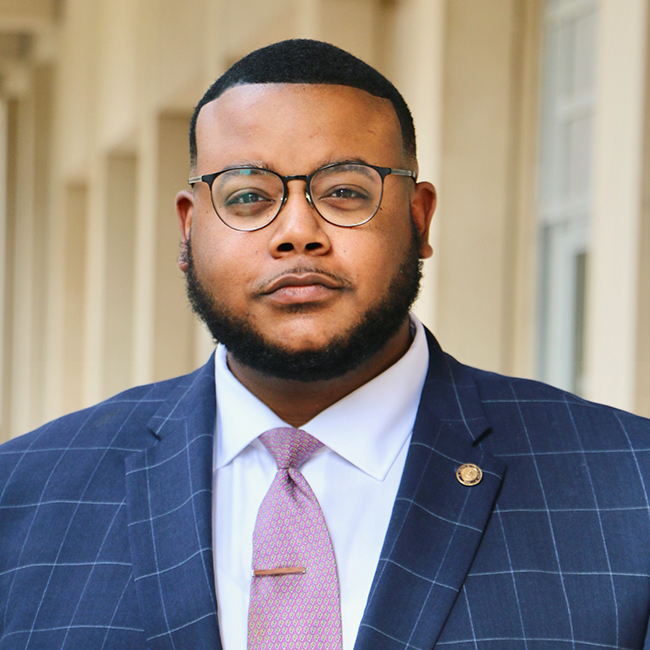While many of the diversity, equity, and inclusion (DEI) leaders we speak to as part of our ongoing series on DEI executives came into those roles almost fortuitously, our subject for this iteration has been involved in DEI efforts since his college days.
Darrell L. Johnson, Jr., MBA, is the manager of diversity and inclusion programs at the Baton Rouge Area Chamber (BRAC). In this role, he leads BRAC’s Economic Inclusion initiatives, including working to improve business services, increasing corporate and workplace diversity, and pushing for reinvestment and redevelopment. Most recently, he spearheaded the Drive Minority Business Accelerator Program, which is designed to help minority small business owners gain the knowledge, resources, and networks necessary to advance their business’s financial, marketing, and talent strategies.
Johnson also served on the Small Business Services team at Louisiana Economic Development, where he assisted in the expansion of the LED Growth Network, an alumni network of over 500 Louisiana-based small businesses that employ more than 15,500 full-time employees and represent over $3.3 billion in annual sales.
A Productive and Impactful Internship
Johnson says his DEI work really started when he landed an internship with a music festival during his college years—a role that exposed him to how major corporations think about engaging with different demographic groups.
“I began this journey interning with Essence Festival, which is the largest live event festival in the nation, held in New Orleans, Louisiana,” Johnson explains. He split his time in this role in the sponsorship activation department working with various large brands that helped him understand corporate strategy.
“These brands curated various integrated marketing campaigns throughout the festival weekend that celebrated communities of color,” he says. While in this role, Johnson moved from intern to sponsorship assistant and, ultimately, to sponsorship assistant manager—all while he was still in college.
Community Outreach
For those who weren’t already jealous of Johnson’s opportunity to work for a major music festival, he also had the opportunity work with the 2017 NBA All Star program after graduating from college, specifically with the All Star game’s supplier diversity program. Putting on a major event like an All Star game in New Orleans requires working with a variety of local vendors, and Johnson’s job was to engage with the community and let them know what opportunities were available for vendors, particularly diverse businesses.
“The NBA’s decision to replace Charlotte with New Orleans was rooted in their strong commitment to diversity, equity, and inclusion. I was fortunate to be part of a team that focused on identifying local diverse businesses who were able to potentially do business with the NBA during the week’s festivities.”
Johnson leveraged that experience to land a role with Louisiana Economic Development. In that role, he served on the Small Business Services team and was “responsible for repositioning Louisiana as one of the best places to start, grow and sustain a business,” Johnson says.
3 Areas of Focus with BRAC
In Johnson’s current role as manager of diversity and inclusion programs at BRAC, he says he has three primary areas of focus:
- Providing business services
- Advancing corporate and workplace diversity initiatives
- Pushing for reinvestment and redevelopment of underserved communities
A key component of Johnson’s work in the area of providing business services involves proactively connecting small, local, disadvantaged businesses to procurement opportunities from large partner corporations.
Promoting Best Practices
One of the ways Johnson and BRAC pursue the goal of advancing corporate and workplace diversity initiatives is by recognizing businesses in the Baton Rouge area that have demonstrated a commitment to those values and success in DEI efforts through BRAC’s Diversity Star Award.
The award was launched in 2018. “We honor and recognize regional businesses that have championed diversity and inclusion at their businesses or in the community with an annual award,” he says.
This kind of recognition not only rewards the often unsung heroes doing great DEI work but also provides examples and inspiration for others to follow.
Leveraging Partnerships
DEI efforts work best when they’re collaborative and have buy-in and commitment from as many stakeholders as possible. Johnson is highly appreciative and proud of the many partnerships he and BRAC have been able to develop in pursuing DEI goals in the community. These include partnerships with businesses and other organizations, elected officials, and other members of the community.
“I certainly could not do this work alone,” Johnson says. “There’s a true concerted effort to create a more inclusive economy within this region. I’m truly excited about this moment that we’re in – catalytic investments are being made across the country and the work to advance economic inclusion is something that we’ve never seen before.”
Win-Win-Win
Johnson is a firm believer in the business argument for DEI efforts. Businesses that successfully embrace DEI outperform those that don’t, and he notes that local businesses looking to partner with larger national and international organizations are routinely asked to discuss their DEI efforts.
Helping area businesses beef up their DEI programs is a win for those businesses. It’s also obviously a win for diverse businesses and workers who benefit from an increased appreciation for DEI efforts. And if the community and its businesses are succeeding, that’s a win for BRAC, as well.
Johnson’s impact is far-reaching and meaningful—his leadership is a compelling example of the broad impacts that strategic economic development initiatives can have on both individuals and communities.
Lin Grensing-Pophal is a Contributing Editor at HR Daily Advisor.

